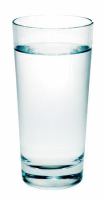Water
Your Body is
70% Water
Each cell in your body is about 70% water. Your body is overall about 70% water. The vital metabolic processes that keep you alive depend on a readily available supply of water to transport nutrients, oxygen, energy throughout your system and carry wastes out. Your blood is 90% water. If the water supply drops only 5% (or 2% of body weight) you've got problems. Energy levels drop, concentration and mental function deteriorates, headaches, muscle aches, fatigue--not to mention constipation--are the sure result. By the time you get thirsty, it's already too late.
The very young and the very old are especially at risk of dehydration. Fever, nausea, disorientation, confusion can signal electrolyte imbalance with rising sodium and urate levels. Continued loss of water increases the risk of infections, tissue breakdown, aging and the risk of degenerative diseases, even colon, urinary, and breast cancer.
Without any water at all the body will die in less than a week.
Water to the Rescue
But long before that, the drop in your water levels can cause serious trouble. Cell volume shrinks, tissue turgor (resilience) fades, wrinkles develop, vertebral disks become compressed, your height drops, urine concentration increases the risk of kidney stones and bladder infections. Even a slight dip in water can cause the lining of your stomach to pucker and cause what many mistake as "hunger pains." Feel the urge to eat between meals? It may just be your body telling you to fill your tank! Try a tall glass of dihydrogen oxide and see how fast the starvation demon runs away.
How Much Water?
A daily dose of as many cc's water as calories consumed is one formula. For example, if you eat 2000 calories a day that translates to about 9 cups of water. If you chow down 3000 calories of fuel for all that heavy physical labor, then you'll need 12 cups. That old adage about 8 glasses a day is just not enough. And if you subsist on a high fiber diet, live in an arid, low humidity environment, exercise, get hot, or drink caffeine or alcohol (both have a diuretic effect), then you'll need even more!
Therapeutic Dose of Water
Water has been used to treat hypertension. A 2002 study reported the use of "water-only fasting as a safe and effective means of normalizing BP." The protocol studied those with systolic pressures 120 or higher but diastolic 90 or less by beginning with a 2 day conditioning diet of fruit and vegetables followed by 14 days of water only fasting. The mean drop in pressure was 20 mmHg systolic and 7 diastolic. The higher the initial pressure, the greater the drop. (Journal of Alternative Complementary Medicine 2002 Oct;8(5):643-50).

